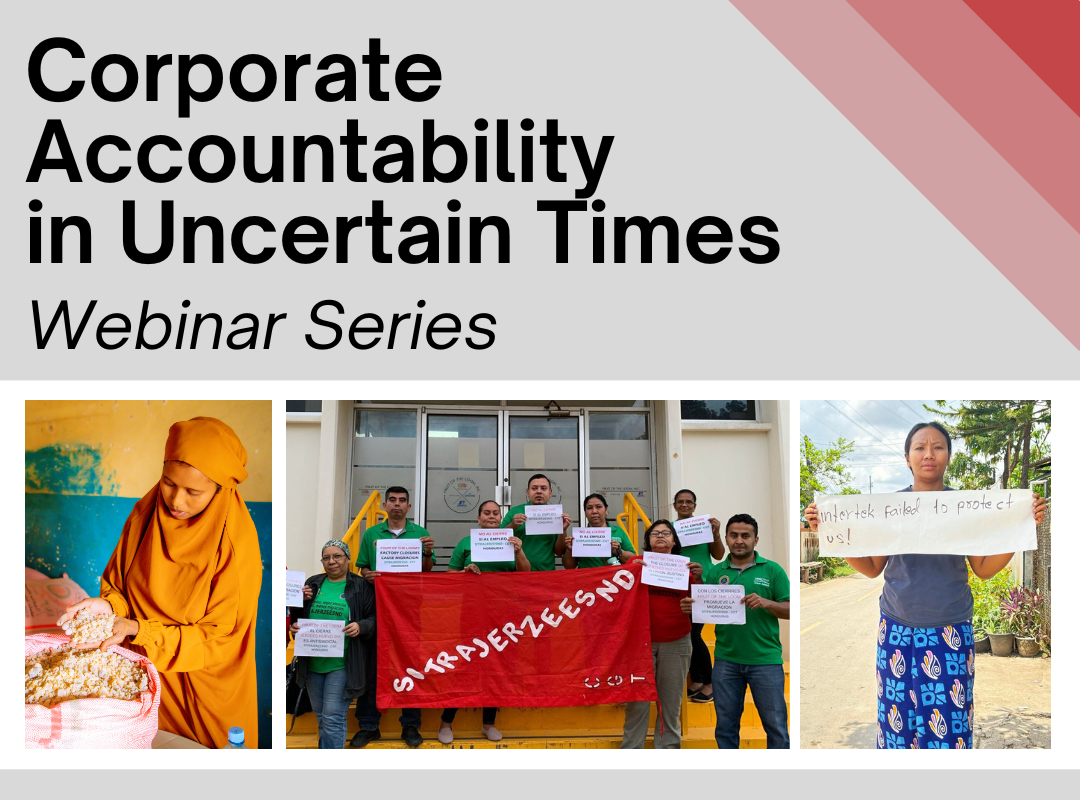Webinar series: Corporate Accountability in Uncertain Times

In 2025, holding corporations accountable is more urgent than ever, as global companies operate with increasing impunity. Shifting political landscapes and weakened regulatory systems have put worker protections at risk, making it harder than ever to uphold fundamental human rights like the freedom to organize. This year, we launched a new webinar series, Corporate Accountability in Uncertain Times, to examine how global corporations and the social auditing firms meant to oversee them are exploiting today’s instability to silence workers, evade responsibility, and roll back hard-won protections.
Watch our most recent webinar in the series, Together We Win: Research, Organizing, & Solidarity for Real Corporate Accountability /Juntxs Ganamos: Investigando, Organizando, & Solidarizandonos para la Responsabilidad Corporativa. Disponible en inglés y español con interpretación.
Though corporate power is on the rise, a recent win with garment workers in Guatemala shows that when we organize and act in solidarity across borders, we can win.
With representatives from the Guatemalan workers’ union as well as the Worker Rights Consortium, which persistently engaged brands on this case, this webinar discusses a powerful, precedent-setting win for workers seeking justice after a factory shutdown left them without jobs or legally-owed pay.
Outsourcing, convoluted ownership structures, and private equity control made this a complicated case; but a cross-border coalition brought together research, investigative, and campaigning skills to ensure workers who had once sewed for Lucky Brand got what they were owed: a full $1.5 million.
You can also watch the recording from our first conversation in the series, Unraveled Commitments: The Global Impact of Fruit of the Loom’s Unionized Factory Shutdowns below. It’s also available in Spanish here.
In early 2025, Fruit of the Loom announced the closure of its last two unionized garment factories in Honduras: Jerzees Nuevo Día and Confecciones Dos Caminos. These closures have displaced over 3,000 workers and marked a stark reversal from the company’s 2009 commitment to respect labor rights in the region. That commitment came in response to global pressure – led by Honduran workers, international advocates, and student movements – which had forced the company to reopen a previously shuttered union factory and take concrete steps toward ensuring the right to organize.
Now, those promises have unraveled.
This webinar explores the long arc of labor organizing within Fruit of the Loom’s Honduran operations, the international solidarity that shaped the company’s commitments, and the profound implications of these latest factory closures.
The second webinar in our series, Checking Boxes, Cheating Workers: How Social Audit Firms are Complicit in Labor Rights Abuses, is viewable below.
This webinar accompanied the launch of our report by the same name. The report examines the role of social auditing firms in supply chain regulation through three case studies. These case studies build on existing research to show how social audit firms are not just failing to discover abuses but actively undermining workers’ rights and co-signing corporations’ attempts to skirt responsibility.
The third webinar in our series, Healing for Whom? Addressing Human Trafficking in Essential Oil Brand doTERRA’s Frankincense Supply Chain, is viewable below.
In recent years, worker rights enforcement roles have shifted from government to private entities. Social auditing, once heralded as a solution to labor abuses in global supply chains, has been at the heart of this new private enforcement scheme–despite its well-documented failures.
A new report Checking Boxes, Cheating Workers: How Social Audit Firms are Complicit in Labor Rights Abuses demonstrates that social auditing is not just failing, but is actively supporting corporations in dodging accountability. This conversation is especially critical as the EU’s Corporate Sustainability Due Diligence Directive (CSDDD) has the potential to further enmesh commercial social audits into law, and as the U.S. cuts support for worker rights at home and overseas.
In this webinar, we’ll hear from worker leaders, campaigners, and experts in business and human rights to discuss how commercial social auditing fails workers, and an alternative, rights-respecting path forward.
